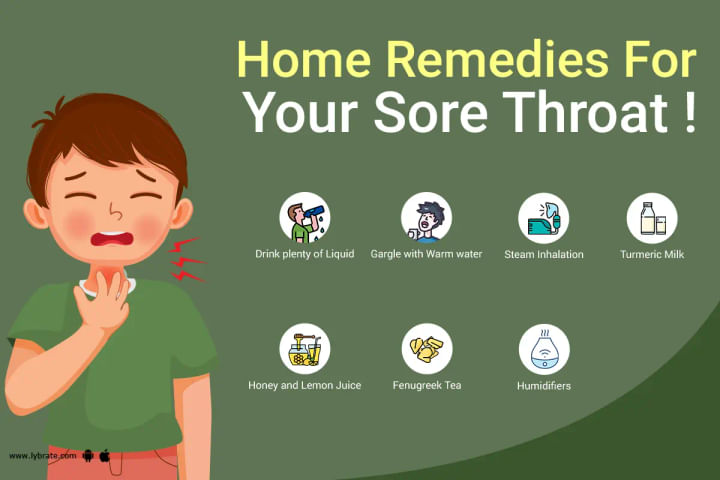Get the App
For Doctors
Login/Sign-up
Last Updated: May 04, 2023
BookMark
Report
12 Ways to Help a Sore Throat
What is Sore throat?
A sore throat is a painful sensation in the throat. It is also known as throat pain. A variety of ailments, including allergies, dry air, bacterial or viral infections, and the common cold, can cause it. The treatment for a sore throat is determined by the underlying cause. Some easy home treatments might provide symptom alleviation and aid in the recovery process.
What are the signs and symptoms of Sore throat?
A sore throat is a painful and uncomfortable condition in the throat. Symptoms typically include:
- A scratchy or dry sensation,
- Difficulty swallowing,
- Swollen glands in the neck, and
- Hoarseness.
- Other symptoms may include fever, runny nose, headache, bad breath, tiredness, coughing and hiccups.
What are possible complications of Sore throat?
Common complications of a sore throat include:
- Difficulty eating and drinking,
- Increased risk of infection from oral bacteria,
- Difficulty in speaking due to swelling in the vocal cords,
- Inflammation of other parts of the upper airstream,
- Difficulty sleeping due to intense pain or discomfort,
- Facial swelling and stiffness in the neck.
- In severe cases, abscesses and obstruction can develop resulting in breathing difficulties.
- Additionally, a sore throat can be an indication of chronic systemic diseases such as rheumatoid arthritis or Sjogren’s syndrome that require additional medical treatment for effective management.
12 Ways to Help a Sore Throat
- Gargle with warm saline water: Adding a teaspoon of salt with 8 ounces of warm water and gargling can help to soothe and reduce inflammation in the throat.
- Drink plenty of fluids: Maintaining an adequate level of hydration helps to reduce the thickness of mucus and protects against a dry throat. The irritation that can be caused by a sore throat is reduced as a result of this. There are many strategies to stay hydrated, including drinking water, herbal tea, soup, and fruit juice that has been diluted with water.
- Avoid foods that aggravate the throat: When you have a sore throat, you should avoid eating foods that are spicy or acidic since they might make the painful throat even worse.
- Eat pungent tasting food items: Pungent tasting items such as garlic, onion, horseradish, caffeine-free ginger tea, or miso can help to thin out mucus in your throat and make breathing easier.
- Try steam inhalation therapy: Steam inhalation helps to break up phlegm in the lungs while providing relief from inflammation of the respiratory passages due to colds or allergies. Add two drops of eucalyptus oil in an inch of hot water; then cover your head with a towel and breathe deeply for 7-10 minutes with eyes closed.
- Throat lozenges: Throat lozenges are great for providing short term relief but ask for sugar free ones since most contain sugar which isn’t good for teeth health long term.
- Use honey and lemon juice: Mix 1 teaspoon each of lemon juice and honey in a cup of warm water and drink it a few times a day to soothe the throat and boost healing properties in the body.
- Turmeric milk: Drinking lukewarm milk mixed with turmeric powder before going to bed can provide incredible relief from sore throat discomfort.
- Try Fenugreek tea: Drink Fenugreek tea regularly, this helps a lot in reducing inflammation caused due to ripped throat muscles.
- Humidifiers: Try humidifiers indoors, especially during winter months where dry air makes it harder for throat passages to stay moist naturally - adding more humidity into our environment helps prevent infections also!!
- OTC Medications: Take pain relievers that are available without a prescription, such as ibuprofen or acetaminophen.
- Avoid talking loudly if possible: Whispering is better than shouting when dealing with infections that may aggravate inflammation caused by an illness.
If the above remedies do not work, you may have to opt for surgical procedures.
What are the surgical treatments for Sore throat?
- Endoscopic Sinus Surgery: This procedure involves using small instruments and a camera to remove blocked sinuses or tissue from the nose and throat that may be causing soreness and irritation.
- Laser-Assisted Uvulopalatoplasty (LAUP): This procedure involves using a laser to remove excess tissue from around the uvula (the soft hanging part at the back of your throat). It can help reduce snoring and improve breathing, as well as relieve symptoms associated with soreness in the throat.
- Uvulo-palato-pharyngoplasty (UPPP): UVulo-palato-pharyngoplasty (UPPP) is a type of surgery that involves making an incision in the soft palate and tonsils in order to improve their function. During UPPP, tissue from the base of the tongue, soft palate, and tonsils are removed to enlarge the airway and improve breathing. This procedure may also reduce snoring. The majority of patients report dramatic improvement in breathing after UPPP surgery. In some cases, however, the symptoms may return within three months to a year after surgery.
- Tonsillectomy: Tonsillectomy refers to a surgical technique that removes the tonsils from the mouth and back of the throat. People who have frequent, recurring sore throats or who have difficulty swallowing as a result of swollen tonsils typically find that this treatment is beneficial. Because a sore throat can have many different causes, it’s important for those thinking about having a tonsillectomy to discuss their medical history with a medical professional before making any final decisions.
- Adenoidectomy: Adenoidectomy is a procedure that can help treat sore throat. It involves the removal of adenoids, which are located at the back of the nose. They are part of the lymphatic system, and when they become enlarged they can block sinuses and cause difficulty breathing. Removing them can alleviate these symptoms as well as reducing sore throat pain.
Best doctors to consult for Sore throat?
- Allergist: If your sore throat is persistent and associated with other allergy symptoms such as sneezing, itchy eyes, or a runny nose, you should visit an allergist. An allergist can evaluate your symptoms and help diagnose underlying conditions that may be causing your sore throat. They may also be able to provide medications or treatment options to relieve your discomfort.
- Ear, Nose and Throat (ENT) Specialists: If you have a sore throat that does not improve after self-care measures such as using a humidifier and drinking plenty of fluids, you may want to see an ear, nose, and throat (ENT) specialist. A expert in ears, noses, and throats (ENT) can assist in determining the reason of your sore throat and give you with treatment options.
- Dentists: Dentists can help diagnose and treat sore throat symptoms if they're related to a dental issue, such as an abscessed tooth or gum infection.If the sore throat is not caused by a problem with your teeth, your dentist should be able to recommend that you seek additional assessment from either your general care physician or an ear, nose, and throat specialist.
- Endocrinologists or Diabetes Specialists (if you have diabetes, as sore throats can be a sign of complications with diabetes).
In case you have a concern or query you can always consult a specialist & get answers to your questions!



+1.svg)
